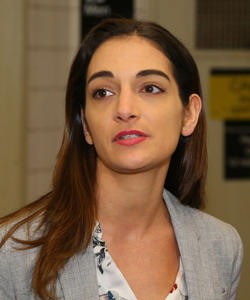Days before the passage of the new rent law, Cea Weaver and a group of tenant advocates were huddled in a conference room in the State Capitol. While they were piecing together rumors from their trusted sources in the Senate, the phone rang: Gov. Andrew Cuomo wanted to meet.
But Cuomo refused to include upstate tenants in the meeting, despite Weaver’s demands that they be present. So, Weaver and the coalition ultimately declined his invitation. She wasn’t going to leave anyone behind to make a backroom deal — even when New York’s top politician was calling.
Celia “Cea” Weaver was the only staff person hired by the tenant coalition, the Upstate/Downstate Alliance, on a $45,000 nine-month contract. She shaped and executed the coalition’s strategy, and had a hand in the development of the Democratic Socialists of America’s template for electoral success.
Ultimately, even as titans of the real estate industry begged Cuomo to intervene, Weaver decided the tenant coalition would achieve a better deal without him. The bold move appears to have paid off. The governor was ultimately closed out of the negotiations over the rent law, with the Assembly and Senate reaching a two-way deal. Instead of relying on lobbyists to compel lawmakers, Weaver and the tenant coalition had set the stage for tenants to make their case directly. The real estate industry never saw Weaver coming, partly because she prefers not to be the center of attention.
“She’s good at back-channeling with politicians,” one source said. “And she weaves a web of connections that is incredibly strong.”
Keeping your enemies closer
At the capitol building’s Dunkin’ Donuts in May, Weaver was working out logistics for the coalition’s most dramatic escalation yet: 2,000 tenants from across the state would fill the state capitol the next day.
Sitting just feet away, Weaver recognized then-president of the Real Estate Board of New York John Banks, providing industry talking points to a couple of landlords. Banks didn’t appear to recognize Weaver, and left a few minutes later.
“I wouldn’t know [Weaver] if she was standing right in front of me,” Banks later told The Real Deal.
Banks confirmed having many meetings in the Dunkin’ Donuts, a home base for Albany insiders catching their breath between lobby visits, and said that he was “trying to execute a strategy.”
The Rent Stabilization Association’s Joe Strasburg called Weaver’s strategy “effective,” although Strasburg was also unfamiliar with the 30-year old coordinator of the campaign that had just toppled real estate, costing the industry billions.
Jordan Barowitz, vice president of public affairs at the Durst Organization, had also never heard of Weaver but said that he disagrees with her approach.
“Creating and maintaining affordable housing is not a horse-race between landlords and tenants,” Barowitz said.
Weaver of course knew both Banks and Strasburg, her ideological opponents, and exploited that knowledge to wage a more effective campaign. She and the tenant coalition kept meticulous records of what landlords and their advocates said in public to respond to their arguments.
Why don’t they know who I am? Ego and confidence. Celia Cea Weaver
“There was a quote from Robert Nelson about dental floss in The Real Deal — and we actually had plans at one point to have a protest with dental floss. What landlords say publicly matters, because it’s a picture of our opponent,” Weaver said. “Why don’t they know who I am? Ego and confidence.”
Who ya gonna call? ‘Cuomobusters’!

Governor Andrew Cuomo (Credit: Getty Images)
Weaver grew up in Rochester, New York, where she attended a majority-black public high school in a deeply segregated city. After college, when many New York City multifamily buildings were in foreclosure, she got a job as a tenant organizer and moved to Crown Heights.
“I began to understand how housing is intersectional, and drives inequality and injustice… the racist housing market, the incredibly extractive real estate industry,” she said. “The role they play in politics has been a driver of a lot of economic injustice.”
A few years later, Weaver helped found the Crown Heights Tenant Union. The group convinced Diana Richardson to run for a State Assembly seat in 2015 — the first politician in recent memory in New York to do so on a platform of expanding tenants’ rights and rejecting real estate money. Weaver helped craft the original pledge to reject real estate money, and Richardson, at the time a Crown Heights community board member, was the only candidate the CHTU could convince to sign. Richardson won overwhelmingly on the Working Families’ Party line in an unusually high-profile special election, three years before the DSA would use the same playbook to elect Julia Salazar.
Richardson is not surprised that four years later, Weaver would be at the helm of the movement pushing for the most radical expansion of tenant rights in a generation. Weaver’s effectiveness at organizing tenants in Crown Heights, a largely African American and Caribbean neighborhood, depended on her ability to identify tenant leaders. “She was talking the talk: It wasn’t fictitious, or fake progressiveness, she had a niche for people,” Richardson told TRD. “Cea is my top advisor in the background,” Richardson said.
“Even if we were negotiating in the conference, she was always getting us data and information,” she said. “She just knows. She’s a walking wealth of information.”

Diana Richardson
Richardson and other politicians had a standing Monday meeting with Weaver throughout the session. The group, which also included Assembly members Yuh-Line Niou, Catalina Cruz and Harvey Epstein, did their best to whip votes and reported their progress each week. Richardson referred to the meetings as a “war room.”
The coalition tracked electeds’ stances on the rent law in an elaborate Google Drive named “Cuomobusters” that more than 200 people in the coalition had access to.
“It was the most detailed Google Drive that I’ve ever seen, with years of stuff. We tracked every single person — their views after people met with them, everything,” NYCC digital organizer K Agbebiyi said.
While few in the real estate industry have ever heard of Weaver, for most tenant advocates, and their allies in the legislature, she is a familiar figure.

Julia Salazar (Credit: Getty Images)
Among the other politicians that count Weaver as an adviser is State Senator Julia Salazar— Weaver was part of a team that helped draft the “Good Cause” eviction bill. The democratic socialist senator said she “vividly remembers” meeting Weaver for the first time, at a DSA meeting in someone’s home.
“Cea Weaver knows how to talk to you as though you are the only person in the room,” Salazar said.
Tough decisions
Near the end of the legislative session, Weaver told the coalition something it didn’t want to hear. It was unlikely their Major Capital Improvements bill— a key issue for local group Woodside On The Move — would pass.
WOTM leader Iván Contreras was disappointed. His organization, smaller and with fewer resources than other tenant groups, had thrown its weight into the campaign from the beginning, pushing with the coalition for a complete elimination of MCIs.
But Weaver felt it was necessary to discuss the political landscape and formulate a plan. Furious, Weaver got up from the table and slammed the door.
Contreras does not recall this specific meeting, although he does recall the interaction. Contreras said it was one of many “difficult conversations” with Weaver during the legislative session.
“That was her role as coordinator,” he said. “[Weaver] had to deal with all of us and get us on board.”
Negotiations between the 13 groups on the organizing committee were at times difficult. Each group brought different priorities, histories and decision models. The tenant movement — like the real estate industry — isn’t a monolith. Individual organizations in the coalition had different resources, targets, personalities and expectations.
After losing the rent law battle for so long, Met Council director Ava Farkas said, many groups fell into a “pattern of tactics and strategy.” Weaver demanded more from lawmakers and maintained a balance between upstate and downstate groups, Farkas said.
“Sometimes things got tense. We all knew we all needed each other and this was our best shot,” Farkas said. “With the Democratic majority, we knew we couldn’t walk away from the table.”
Tenant MVP
At a post rent law DSA meeting in a Midtown conference room, organizers met to recount the 18-month campaign and brainstorm tactics for upcoming fights.
Property is worth less in New York, and we should all be happy about that. An unnamed DSA member
During a round of introductions, organizers gave their name and favorite emoji. Weaver had barely finished when the room — packed with socialist organizers — broke into sustained applause. She appeared equal parts embarrassed by the attention and happy that the room reached a consensus.
One DSA member quipped, “property is worth less in New York, and we should all be happy about that.”
Weaver, who did not take a vacation after the legislative session, said the coalition is already moving to lay out their priorities for 2020. First on the list are the items the coalition failed to push through, including the elimination of Major Capital Improvements, “good cause” eviction and legislation to end homelessness. She is also reminding herself to take breaks. Weaver started getting manicures in August to stop herself from texting. At the time of the interview with this reporter, the glossy red polish was all but chipped away. Determined, she had another manicure scheduled a few days later.
Beverly Newsome, who has known Weaver since her days organizing Newsome’s building in Brooklyn, thinks it’s unlikely she would step away from her role with the campaign, although she said it is possible someone would lure Weaver away.
“[The coalition will] figure out a way for her to stay if she wants to stay, because she was so instrumental,” Newsome said. “You don’t fire your star player if you intend to continue to play.”
